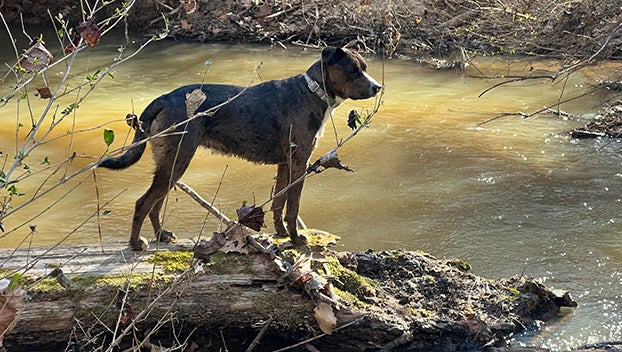Brookhaven veterinarian offers tips on how to keep pets safe in cold
Published 10:00 am Friday, January 12, 2024

- A dog watches for wood ducks intently on the Bayou Pierre. Cold temperatures are forecast for the next few days at below freezing. Be sure to keep your animals warm, fed and hydrated. (Hunter Cloud | The Daily Leader)
BROOKHAVEN — Cold weather is coming and the time to prepare is now. Brookhaven Animal Hospital Veterinarian Gordon Cliburn reminds people they can make sure their animals are taken care of next week with simple steps.
The National Weather Service in Jackson forecasts a cold start to next week. Temperatures could be below freezing with lows in the teens and wind chills in single digits. Frostbite and hypothermia are dangers to humans with prolonged exposure.
Cliburn said the general rule of thumb is if it is cold to the owner then it is cold to the animals to an extent. While animals do have fur to keep them warm the low temperatures are still a hazard.
“We want to make sure we have shelter for them out of the wind. Ideally, if they can be brought inside it’s for the best,” Cliburn said. “A lot of people forget the animals need access to water. With freezing temperatures, an outside water bowl might be frozen solid. It is always important to make sure they are not frozen.”
People may prepare for the winter weather by putting antifreeze in their vehicles. Cliburn said it could lead to a heartbreaking situation. Animals can accidentally be exposed to antifreeze which could cause kidney and liver damage. It can also be deadly.
He said anti-freeze can taste good to dogs and cats and if water supplies are frozen they may find the antifreeze easier. Owners should exercise caution.
Wind is another concern for animals. If an owner does not bring their animal inside then they should provide a shelter out of wind and rain such as a dog house or kennel. Cliburn warns people to be extra careful with artificial heat sources in those shelters.
“If you aren’t careful you can accidentally burn them or start a fire. If they get out in the cold use mild forms of heat to warm them up,” Cliburn said. “Be careful about all sources of heat. Be cautious and minimalistic.”
As for animals who don’t like to be indoors, Cliburn said you just have to trust they will use shelters. Pet owners should also look for signs of them getting too cold.
“They are smart enough to find a cozy spot. Make sure you provide access to a place and a good warm spot for them to curl up in,” Cliburn said. “You will see them shiver or get lethargic and they will look cold. It is usually pretty straight forward.”
Wind breaks, unfrozen water and food are the basics for taking care of livestock. Cliburn said cows and horses need access to unfrozen water. A salt block can help them to make sure they drink enough water. He said sometimes horses are really bad about eating a bunch of hay but not drinking enough water and end up with a belly ache.
Cliburn said most cattle owners know to keep their cows well fed and stack up hay bales or use trees for a windbreak. As long as livestock remain well fed and have a way to get out of rain or wind they will be just fine for a few days.





